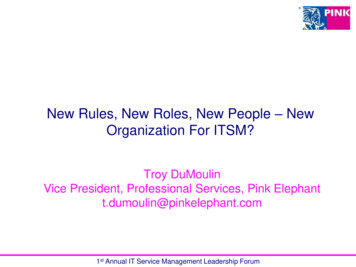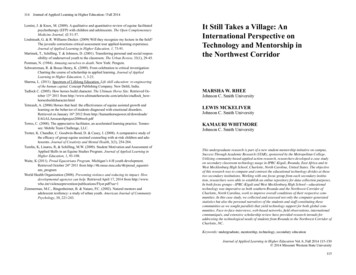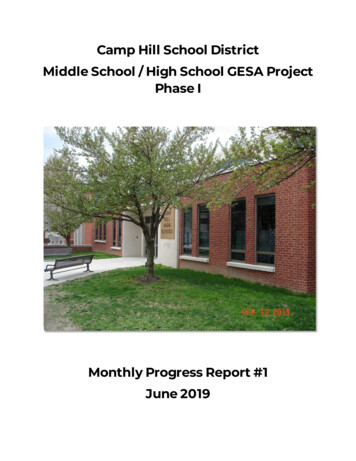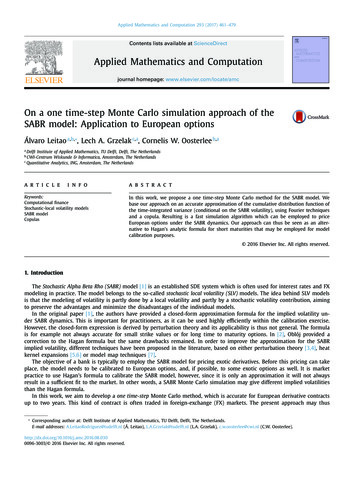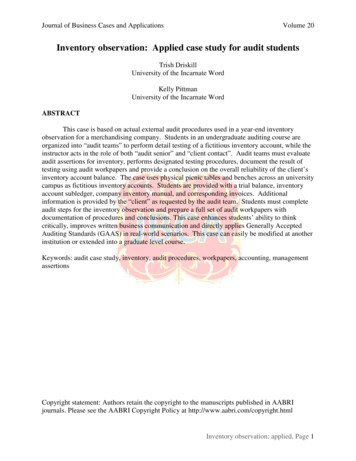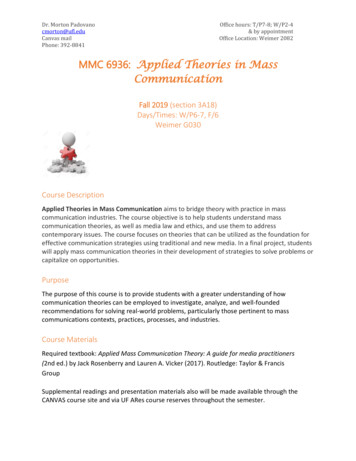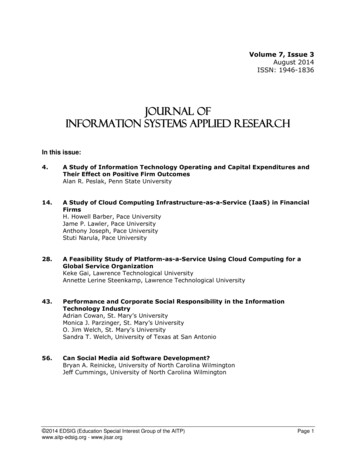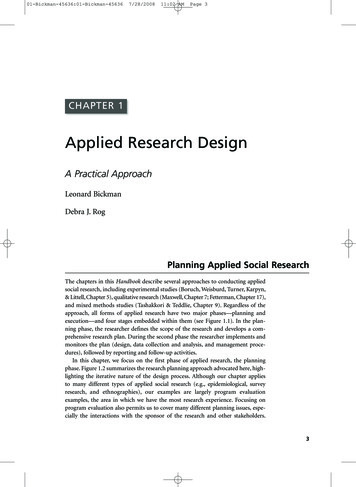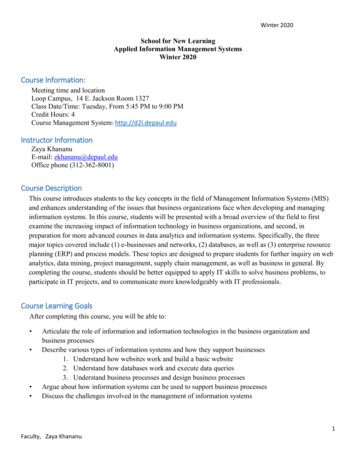
Transcription
Winter 2020School for New LearningApplied Information Management SystemsWinter 2020Course Information:Meeting time and locationLoop Campus, 14 E. Jackson Room 1327Class Date/Time: Tuesday, From 5:45 PM to 9:00 PMCredit Hours: 4Course Management System: http://d2l.depaul.eduInstructor InformationZaya KhananuE-mail: zkhananu@depaul.eduOffice phone (312-362-8001)Course DescriptionThis course introduces students to the key concepts in the field of Management Information Systems (MIS)and enhances understanding of the issues that business organizations face when developing and managinginformation systems. In this course, students will be presented with a broad overview of the field to firstexamine the increasing impact of information technology in business organizations, and second, inpreparation for more advanced courses in data analytics and information systems. Specifically, the threemajor topics covered include (1) e-businesses and networks, (2) databases, as well as (3) enterprise resourceplanning (ERP) and process models. These topics are designed to prepare students for further inquiry on webanalytics, data mining, project management, supply chain management, as well as business in general. Bycompleting the course, students should be better equipped to apply IT skills to solve business problems, toparticipate in IT projects, and to communicate more knowledgeably with IT professionals.Course Learning GoalsAfter completing this course, you will be able to: Articulate the role of information and information technologies in the business organization andbusiness processesDescribe various types of information systems and how they support businesses1. Understand how websites work and build a basic website2. Understand how databases work and execute data queries3. Understand business processes and design business processesArgue about how information systems can be used to support business processesDiscuss the challenges involved in the management of information systems1Faculty, Zaya Khananu
Winter 2020For those with CCS registration: you will gain four credits (4) by demonstrating the followings: Understand the basic concepts of information systems from a business perspectiveExplain the impact that networks have had on business and everyday life for each of the majorcategories of network applicationsExplain how businesses can use mobile computing and mobile commerceExplain the role of Web services in building a firm’s IT applications, using website builder tools,Google Sites or Weebly, etc., and making a business website go liveUse MS Excel application for data and predictive analysesUse Visio to draw data flow diagrams that depict business systemsDescribe the key characteristics and advantages of cloud computingCourse Resources Lecture based on Power Point Presentation.To buy your books, go to http://depaul-loop.bncollege.comRequired ReadingsR Kelly Rainer Jr., Brad Prince (2015). Introduction to Information Systems (6th/7th ed). Wiley.ISBN-13: 978-1119108009ISBN-10: 1119108004Course CompetenciesIn this course you will develop the following competence:CompetenceCompetence Statement and CriteriaS1XCan implement technology solutions to business problemsS3XCan analyze the integration of information technologies in business processesFXCan apply the concepts and tools discussed to one's focus areaAssessment Criteria for the Course CompetencesThe following are criteria for receiving a passing grade. The criteria for passing require that: You participateconsistently and constructively by completing the activities of each module, the readings and assignmentsby their due dates.Course StructureThis course consists of 10 modules. The estimated time to complete each module is 1 week.2Faculty, Zaya Khananu
Winter 2020Course Grade Components (Percentage Distribution) and Grading ScaleGrade ComponentsPercentageMS Office 2016 Assignments & Projects50%Knowledge Assessments25%In-class Discussion/Interactive Quizzes15%Participation and Attendance10%Total100%A 95 to 100A- 91 to 94C 77 to 80C 73 to 76F 60 or below INCINCB 88 to 90C- 69 to 72B 85 to 87B- 81 to 84D 65 to 68D 61 to 64Grades lower than a C- do not earn credit at the School for New Learning.Course CurriculumWeek, Module # and TitleWeek 1, Module 1: Introductionand PortfolioWeek 2, Module 2A: NetworksReadingsAssignmentsPower point presentation (as a supplementfor the Chapter)Recap 1Online resource for DigicationDiscussion 1Textbook (Rainer, Chapter 1)Articles (where applicable)Power point presentation (as a supplementfor the Chapter)Recap 2Textbook (Rainer, Chapter 6)Discussion 2Articles (where applicable)Kompozer Demo WalkthroughWeek 3, Module 2B: WebsitesKompozer manualPower Point presentationAssignment ISetting up a web hostWeek 4, Module 2C: e-BusinessPower point presentation (as a supplementfor the Chapter)Recap 3Textbook (Rainer, Chapter 7)Discussion 3Articles (where applicable)3Faculty, Zaya Khananu
Winter 2020Week 5, Module 3A: DatabasesPower point presentation (as a supplementfor the Chapter)Recap 4Textbook (Rainer, Chapter 5)Discussion 4Articles (where applicable)Week 6, Module 3B: EntityRelationship DiagramsERD WalkthroughPower point presentation (as a supplementfor the Chapter)Textbook (Rainer, Chapter 5)Assignment IIArticles (where applicable)Week 7, Module 3C: RelationalDatabasesWeek 8, Module 4A: ERP andProcess ModellingWeek 9, Module 4B: FlowchartsWeek 10, Module 4C: Data FlowAccess Demo WalkthroughArticles (where applicable)Power point presentation (as a supplementfor the Chapter)Recap 5Textbook (Rainer, Chapter 2 and Chapter 10Discussion 5Flowchart WalkthroughArticles (where applicable)Assignment IIIData Flow Diagram WalkthroughArticles (where applicable)Changes to SyllabusThis syllabus is subject to change as necessary and I will be clearly discussing and announcing it in class.PoliciesAttendanceClass attendance is mandatory. It is part of the course assessment, and it is very important that you do not miss thefirst day of the class.Course Withdrawal Timelines and Grade/Fee ConsequencesAcademic IntegrityDePaul University is a learning community that fosters the pursuit of knowledge and the transmission of ideas withina context that emphasizes a sense of responsibility for oneself, for others and for society at large. Violations ofacademic integrity, in any of their forms, are, therefore, detrimental to the values of DePaul, to the students’ owndevelopment as responsible members of society, and to the pursuit of knowledge and the transmission of ideas.Violations include but are not limited to the following categories: cheating; plagiarism; fabrication; falsification orsabotage of research data; destruction or misuse of the university’s academic resources; alteration or falsification ofacademic records; and academic misconduct. Conduct that is punishable under the Academic Integrity Policy couldresult in additional disciplinary actions by other university officials and possible civil or criminal prosecution. Pleaserefer to your Student Handbook or visit http://studentaffairs.depaul.edu/homehandbook.html for further details.Academic Integrity Policy4Faculty, Zaya Khananu
Winter 2020PlagiarismPlagiarism is a major form of academic dishonesty involving the presentation of the work of another as one's own.Plagiarism includes but is not limited to the following: The direct copying of any source, such as written and verbalmaterial, computer files, audio disks, video programs or musical scores, whether published or unpublished, in wholeor part, without proper acknowledgement that it is someone else's.Copying of any source in whole or part with only minor changes in wording or syntax, even with acknowledgement.Submitting as one's own work a report, examination paper, computer file, lab report or other assignment that hasbeen prepared by someone else. This includes research papers purchased from any other person or agency. Theparaphrasing of another's work or ideas without proper acknowledgement. Plagiarism, like other forms of academicdishonesty, is always a serious matter. If instructor finds that a student has plagiarized, the appropriate penalty is atthe instructor's discretion.Disability AccommodationsReasonable accommodations will be provided for students with disabilities on an individualized and flexible basis.The Office of Students with Disabilities (OSD) determines appropriate accommodations through consultation withthe student. For certain learning disabilities and/or attention deficit disorders, the Productive Learning StrategiesProgram (PLuS) determines the appropriate accommodations. See the instructor for more information or call OSD at773-325-7290 (phone) or 773-325-7296 (TTY); or call PLuS at 773-325-1677.Incomplete GradesThe intent of the incomplete grade is to allow students extra time to complete their final assignments. This needarises because, in the closing weeks of the course, they have an event of significant magnitude that adversely affectstheir ability to complete the course, e.g. serious illness, death in the family, overseas deployment, or naturaldisaster. You must request an incomplete grade in writing two weeks before the end of the quarter. Incompletegrades will be considered only after you have satisfactorily completed at least 75 percent of the coursework, andyou have such an unexpected, uncontrollable event that prevents you from completing your course. Do not assumethat you will qualify for an incomplete. Students who are failing the course at the point where they request anincomplete will not receive one, nor will they be granted after the end of the quarter. Incomplete grades are givenat the discretion of the instructor. If you do receive permission from the instructor to take an incomplete in thecourse, you will be required to complete a contract with the instructor, specifying how you will finish the missingwork within the next two quarters (excluding summer). Incompletes not finished by the end of the second quarter(excluding summer) will automatically become an F grade on your transcript. Instructors may not change incompletegrades after the end of the grace period without the permission of a college-based Exceptions Committee.Incomplete Policy NOTE: In the case of a student who has applied for graduation and who has been approved for anIncomplete in his or her final term, the incomplete must be resolved within the four week grace period before finaldegree certification.5Faculty, Zaya Khananu
Winter 2020Protection of Human SubjectsFor more information see: http://research.depaul.edu/ Demonstrating the acquisition of competences in this coursecan involve “interactions”–interviewing and or observing other people–discussing those interviews or observationswith other class members and writing them up in one or more final report(s). As such, these activities qualify as“research” with “human subjects” and are subject to University and Federal guidelines. Because it takes place in thecontext of this course, your research is exempt from approval by the School for New Learning’s Local Review Boardonly under the following conditions: The information you collect is EXCLUSIVELY for the purpose of classroomdiscussion and will NOT be used after the term is over. If there is any possibility that you will EVER use it in furtherresearch or for publication, you must obtain approval from the Local Review Board before you begin.1. You assess and ensure that no “harm”–physical, mental, or social–does or could result from either yourinterviews and/or observations or your discussion and/or reports.2. The privacy and confidentiality of those that you interview or observe must be protected. Unless you receivespecific permission, in writing, from the person(s) you interview or observe, please change their names, andmake sure that their identity cannot be readily ascertained from the information you provide.3. If you want to use real names and relationships, they must sign an “informed consent” document. Forinformation on creating an “informed consent document” see, for example,http://www.research.umn.edu/consentCollege and University PoliciesThis course includes and adheres to the college and university policies described in the links below:Academic Integrity Policy (UGRAD)Academic Integrity Policy (GRAD)Incomplete PolicyCourse Withdrawal Timelines and Grade/Fee ConsequencesAccommodations Based on the Impact of a DisabilityProtection of Human Research ParticipantsAPA citation format (GRAD)Course ResourcesUniversity Center for Writing-based LearningSNL Writing GuideDean of Students Office6Faculty, Zaya Khananu
Winter 2020Instructor Brief BioZaya Khananu holds a master degree in Telecommunication Systems from DePaulUniversity, and a Certificate in Local Area Networking (LAN) from De PaulUniversity. Mr. Khananu has been a member of the visiting faculty at the Schoolfor New Learning since September p where he teaches online andon campus Quantitative Reasoning, Introduction to Statistics, ComputerProductivity, and most recently designed and taught a new course titledData Driven Decisions. Mr. Khananu also serves as Professional Advisor in Computing and InformationTechnology. Mr. Khananu is a member of adjunct faculty at the Liberal Art & Sciences since 2009, where heteaches pre-calculus and business calculus. In addition to his work at DePaul University, Mr. Khananu is amember of the adjunct faculty in the Truman College Business and Computer Science department since 2007,where he teaches Introduction to Information Technology and Advanced Internet. Mr. Khananu is pursuing hissecond MS in Predictive Analytics from DePaul University College of Computing and Digital Media.7Faculty, Zaya Khananu
information systems. In this course, students will be presented with a broad overview of the field to first examine the increasing impact of information technology in business organizations, and second, in preparation for more advanced courses in data a
